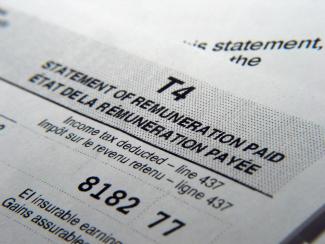
Are you ready for tax season? These changes this year might affect your filing.
It is, like the famous saying goes, one of life's certainties. Nestled between winter and spring, it's the favourite time of year for someone out there, but for most, it's a chore: tax season is here.
From changes to the method for expensing work-from-home costs, accounting for new tax-free savings, or making repayments for government subsidies during COVID-19, these are just some things to look out for when filling in your paperwork.
Here's everything you need to know before filing your taxes this year.
What is the deadline for filing taxes?
For most Canadians, the deadline to file your taxes is April 30, which is also the deadline for paying any owed amounts.
Self-employed Canadians have some extra time to file, with a deadline of June 15.
Do I need to file my taxes?
Failing to file a return is considered tax evasion and can result in harsh fines.
You won't want to delay on paying any amount owed on your tax return either, Jamie Golombek, the head of tax and estate planning at CIBC Private Wealth, warned. Late payments are subject to a steep interest rate (ten per cent) on any amount owed past April 30, he said.
Most Canadians will also get a refund, and many low-income Canadians can get benefits, including the Canada Worker Benefit or Canada Child Benefit, by completing a tax return.
For those with low-incomes who need extra help filing their taxes, many community organizations have tax clinics to help out. The Parkdale Queen West Community Health Centre, for example, offers free tax clinics to Torontonians earning less than $30,000 for a single person.
What is new for the tax season this year?
"The good news is that there's not a lot that's changed," Golombek said.
The major change, he added, is the Canada Revenue Agency reverting to a more complicated system for calculating work-from-home expenses.
How to claim work-from-home expenses
If you worked from home for more than half the work week, you can claim portions of your utilities, internet costs and rent paid.
But, tax filers should watch out, Golombek warned, as the CRA has eliminated its simplified method for calculating expenses this year, meaning filing expenses will require more heavy lifting and employees will need a T2200 form signed by their employer.
"Having this discussion right now is really appropriate in February because the returns are due April 30 and there will be a lot of work that needs to be done by employees who wish to claim a home office expense," Golombek said.
How to file taxes for my First Home Savings Account (FHSA)?
Canadians who opened a new First Home Savings Account (FHSA) should also remember to claim their deduction or defer it for a future year, "if perhaps you're going to be in a higher tax bracket in a future year and maybe the deduction is worth more," Golombek said.
The FHSA became available in April and allows prospective home buyers to contribute up to $8,000 of tax-free savings each year, up to a lifetime total of $40,000.
Are COVID-19 benefit repayments tax deductible?
If you claimed a COVID benefit, like the Canadian Emergency Response Benefit (CERB), and were one of the many Canadians asked to pay the money back, you can claim those repayments, Golombek explained.
"You can claim a deduction on your 2023 tax return for any COVID benefits you had to repay in 2023," he clarified.
In a report from December 2022, an Auditor General report found that Ottawa had send nearly $4.6 billion in emergency relief funds to ineligible Canadians, prompting a mass campaign by the CRA to get Canadians to pay back the money.
Should I use tax software or an accountant?
The vast majority of Canadians — over 90 per cent last tax season — used software to prepare their tax returns, according to the CRA. And most people who are just filing their income through T4 slips, software is probably the method for you, Golombek said.
But, for Canadians that are self-employed, for gig workers, for anyone whose return might be more complex, a professional might be worth the investment.
"That's where someone with deep experience," Golombek said, "who's literally done thousands of tax returns can look at your return and say, 'hey, other clients in this situation, they're writing off their car, or they're taking up clients for lunch and claiming expenses. I don't see any of this in your returns. Are you missing something?'"
Author: Andy Takagi for The Toronto Star

